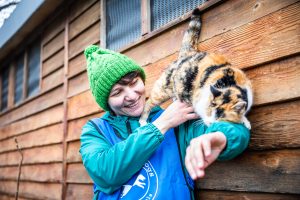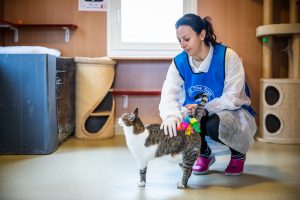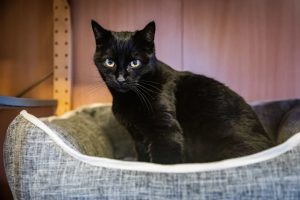Why do cats "knead"?
Kneading is an innate and instinctive behavior in cats. Let's explore what this behavior signifies and which aspects we should pay particular attention to.
Kneading is a sign of comfort and well-being in adult cats, almost always associated with positive experiences
From the moment they are born, kittens demonstrate the act of kneading as a natural and instinctual behavior. This action, first observed while nursing on their mother’s belly, entails rhythmically extending and retracting their paws, similar to the process of kneading dough. This behavior originates from the earliest stages of a kitten’s life when they endeavor to stimulate milk production by gently pressing their paws against their mother’s abdomen. As a result, it is closely linked with a sense of comfort and contentment for them.
What it means when a cat kneads its paws
As cats grow into adulthood, a significant number continue to display this behavior, frequently accompanied by purring, signaling their contentment and happiness. Unlike kittens, adult cats have the ability to purr without engaging in kneading. Kneading is a sign of comfort and well-being in adult cats, almost always associated with positive experiences. It serves as a form of regression for them, evoking moments of intimacy and acceptance.
Read also: Cat motivation

When a cat kneads their human companion, he or she is communicating a desire to share their state of well-being
What does it mean if your cat kneads you?
You may observe your cat kneading on soft surfaces such as blankets or pillows. Often, when there is a good relationship with their human companion, the cat may climb onto your lap during a quiet moment, perhaps while you are relaxing on the couch, and start kneading you.
When a cat kneads their human companion, he or she is communicating a desire to share their state of well-being. When this happens, it is important not to abruptly interrupt their behavior or scold your cat, but simply to embrace this sharing behavior. Responding with gentle strokes on the head or simply not interrupting the cat helps strengthen the emotional bond between you.
What does it mean if my cat never kneads me?
Contrary to a common misconception, the fact of a cat never kneading is not indicative of a problem or a lack of trust or affection towards their human companion. Not all adult cats engage in this behavior, and its absence should not be a cause for concern. Every cat is a unique individual and has his or her own way to express feelings and motivations.

Sometimes, the origin of this behavior may also be due to psychological discomfort caused by stress factors
Can kneading have negative connotations in certain contexts?
It may happen that some cats purr and also knead in times of physical discomfort. This occurs because they are trying to engage in a behavior that allows them to self-comfort. It’s not dissimilar to what we do when we feel unwell and seek comfort, for example, in a warm blanket or by getting someone to take care of us.
Sometimes, the origin of this behavior may also be due to psychological discomfort caused by stress factors. This is the case, for instance, when the conduct becomes repetitive, and the cat continues to knead excessively for many hours. In this situation, it is crucial to assess the surroundings and conditions that could potentially induce stress in the cat.
In conclusion, kneading is a complex and meaningful behavior in cats that goes well beyond the simple action of kneading. Respecting the signals and understanding the individual needs of your cat will help create a good relationship between you. And remember: every single cat is unique!
